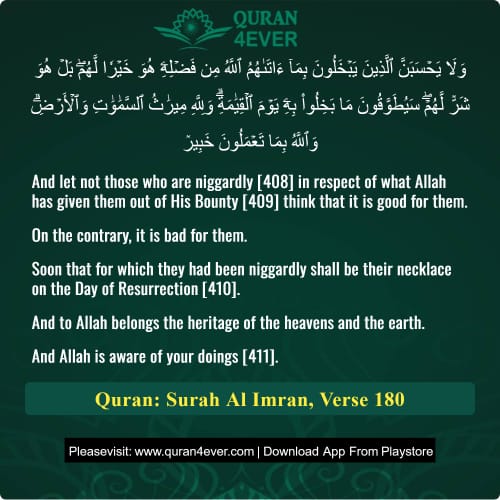
Transliteration:( Wa laa yahsabannal lazeena yabkhaloona bimaa aataahumul laahu min fadilhee huwa khairal lahum bal huwa sharrul lahum sayutaw waqoona maa bakhiloo bihee Yawmal Qiyaamah; wa lillaahi meeraasus samaawaati wal ard; wallaahu bimaa ta'maloona Khabeer )
“And let not those who are niggardly [408] in respect of what Allah has given them out of His Bounty [409] think that it is good for them. On the contrary, it is bad for them. Soon that for which they had been niggardly shall be their necklace on the Day of Resurrection [410]. And to Allah belongs the heritage of the heavens and the earth. And Allah is aware of your doings [411].”
The term “niggardly” refers to miserly behavior in all forms of obligation—whether in:
Human rights (e.g., helping relatives, parents, or children),
Religious rights (e.g., paying Zakat),
Or the rights of Allah.
Thus, anyone who withholds Zakat, or neglects financial duties toward their dependents, is categorized as a miser, and such behavior is condemned in this verse.
This verse clarifies that miserliness is not limited to wealth alone. The use of the general word “what” means it also applies to:
Knowledge,
Power,
Or any other blessing.
From this, we understand that everything we possess—be it wealth, intelligence, or status—is a gift from Allah, not something earned solely through personal merit. Withholding these blessings from others is a betrayal of divine trust.
As mentioned in the Hadith, the one who does not pay Zakat will have his wealth turned into a venomous snake on the Day of Judgment. This snake will:
Wrap around his neck,
Continuously bite him, and
Say to him, “I am your wealth—the one on which you refused to pay Zakat.”
This terrifying scene is echoed in this verse, where the object of miserliness becomes a necklace—symbolizing disgrace, punishment, and torment. (Tafseer Khazain)
We also learn that receiving Allah’s bounties while continuing in sin is not always a favor. It can be a form of divine punishment—like poison hidden in honey.
Conversely, if punishment comes quickly after a sin, it is a sign of Allah’s mercy, because it gives the sinner a chance to repent and purify themselves.
Allah’s knowledge encompasses all deeds, intentions, and secrets. He knows who is grateful and sincere, and who is hoarding and deceptive.
The tafsir of Surah Imran verse 180 by Ibn Kathir is unavailable here.
Please refer to Surah Imran ayat 176 which provides the complete commentary from verse 176 through 180.
(3:180) Those who are niggardly about what Allah has granted them out of His bounty think that niggardli ness is good for them; it is bad for them. What they were niggardly about will turn into a halter round their necks on the Day of Resur-rection. To Allah belongs the inheritance of the heavens and the earth;[127] and Allah is well aware of what you do.
127. Everything in the heavens and the earth belongs to God alone. Hence the possession and use of anything by man is purely transient. For everyone will be dispossessed of his temporary belongings, and everything will ultimately return to and abide with God. If anyone therefore spends openheartedly in the way of God out of his temporary possessions he does so from property which, ultimately, belongs to God alone. Anyone who hoards his possessions and fails to spend them in the way of God is indeed stupid.

For a faster and smoother experience,
install our mobile app now.
Related Ayat(Verses)/Topics